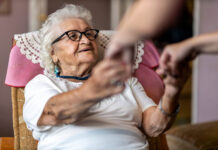
If you registered with My Aged Care, the Aged Care Assessment Team (ACAT) will help you find care for your older loved one. An evaluation in which a member of ACAT learns more about your case is one of the initial steps to determine if your family qualifies for government assistance.
Since receiving package funding might take up to twelve months, starting the ACAT process early is crucial. This article will provide you with the steps to guide you on the process and some tips to assist your loved one who will undergo the aged care assessment.

Aged Care Assessment Procedure
Getting ready for your evaluation will make it easier and help you acquire the services that fit your needs well. Here’s a guide you can reference whether you or a loved one needs to undergo an aged care assessment:
Where to Begin
The first step is to create an account on the government-run website for elderly care, My Aged Care. This aged care facility can be contacted via phone or by submitting an online application.
You will answer some basic questions about yourself to determine which services suit your requirements. Your responses will also determine whether a RAS or ACAT/S evaluation is necessary.
A Regional Assessment Service or RAS will be utilized if you need essential home support through the Commonwealth Home Support Programme. If you are eligible for higher-level support, such as a Home Care Package, short-term care choices, or nursing home support, an ACAT/S assessment will be used.
Assessment Preparation
Be sure to gather the following requirements before your assessment:
- An ID such as a passport, driver’s license, healthcare card, or Department of Veterans Affairs (DVA) card that can be presented as proof of identity
- Health card
- Doctor referrals (if any)
- A list of things you want to talk about and any services for seniors that you think would be helpful
- All of your doctor’s and other health professionals (allied health professionals, social workers) contact information
- Religious and cultural considerations or unique care needs
- All formal and informal care, assistance, and services you got
If you have everything you need ready before the assessment, you won’t have to scramble to find it or worry that you’ll forget something crucial that the assessor should know.

Actual Assessment
Meeting with the elderly care assessor in person is the following stage. Typically, this is a medical expert like a doctor or nurse who will interrogate you extensively on many aspects of your life, including:
- Household situation
- Daily tasks you struggle with
- Find out what you value to remain independent
- Which services you could use at your house or a nursing home if you need more complex care
A friend or family member can accompany you to the appointment to answer questions and provide context. You can also bring medical records to explain any concerns you may have.
After undergoing an RAS assessment, you will immediately learn your eligibility for CHSP services. On the other hand, the assessor may require additional time to review all the information in an ACAT/S assessment.
Follow-up Meeting
Within two weeks following your examination, My Aged Care will send you a letter informing you of your eligibility for aged care services. After that, you can start looking for a senior care facility, fill out an application, or contact home care or short-term care providers to get your needed support.

How to Assist Your Loved One for Aged Care Assessments
Because receiving package funding might take up to twelve months, starting the ACAT process early is crucial. Consider the following tips to ensure your upcoming ACAT examination goes off without a hitch.
Offer Assistance
When getting ready for an ACAT test, your loved one doesn’t need to handle everything independently. Consider going with a loved one on the assessment day, as seniors can bring anybody they choose to sit with. By exchanging details, you can assist your loved one in expressing their wants more clearly.
Have the professional caregiver help your loved one fill out the assessment with details about their limitations and needs if they are receiving assistance from a caregiver. Independence may become more of a challenge for elders due to several age-related health issues.
However, with the help of expert in-home care, many of the difficulties they encounter can be lessened. Many highly skilled professionals can ensure the well-being of elderly loved ones as they age in place.
Record Every Time Your Loved One Needs Help
ACAT will ask if your loved one needs help with grocery shopping, cooking, or self-care during the examination. To be better prepared for these inquiries, make a detailed note of every time your loved one had trouble in the weeks preceding the evaluation.
Please take a moment to consider every instance when your loved one’s health hinders their ability to go about their everyday lives.
Maintain the Current Condition of the House
Knowing that someone is going to their house to look around could make you want to put in a lot of extra effort to make it appear suitable. Remember, though, that the purpose of an ACAT evaluation is to provide you with an accurate picture of the difficulties your loved one encounters. Clean up as much as you like, but do your best to maintain the existing layouts.
Do not, for instance, conceal all signs that your loved one sleeps upstairs while they must sleep on the sofa due to an inability to manage stairs.

Give a Brief Account of Your Family Member’s Finances
Funding for the Home Care Package is frequently income-based. While you wait for an ACAT meeting, which could take several weeks, gather details about your loved one’s income, investments, and pensions. This is where the Department of Human Services comes in handy.
Even while it’s not required, getting your loved one’s finances in order can help the evaluation process and the ACAT test go more quickly. Family carers frequently shoulder additional duties. These duties include handling their parents’ finances, on top of meeting the basic requirements of their loved ones, and the amount of work can be excessive.
Also, family members who take care of elderly loved ones may require breaks from time to time to do things like do errands, nap, work, or even take a vacation. This process can be a real problem for some seniors who require occasional help around the house.
Know Your Loved One’s Health
The ACAT will have some health information about your loved one, but don’t expect them to study his or her medical files to determine his or her healthcare needs. Your loved one might consult a doctor for a checkup and inquire about potential topics to cover during the ACAT evaluation.
Make notes to assist your loved one in remembering to mention any significant healthcare needs if they are anxious about forgetting.

Valuable Healthcare Needs for the Aged
To ensure a seamless transition into the aged care system that suits your needs, it is essential to prepare appropriately for your ACAT exam. Get everyone you care about involved, think about what’s most important to you, compile all the paperwork you’ll need, know what questions to ask the assessor, and know your rights.
If you follow the procedures mentioned above, you will be prepared to lead the charge of your elderly care journey.






